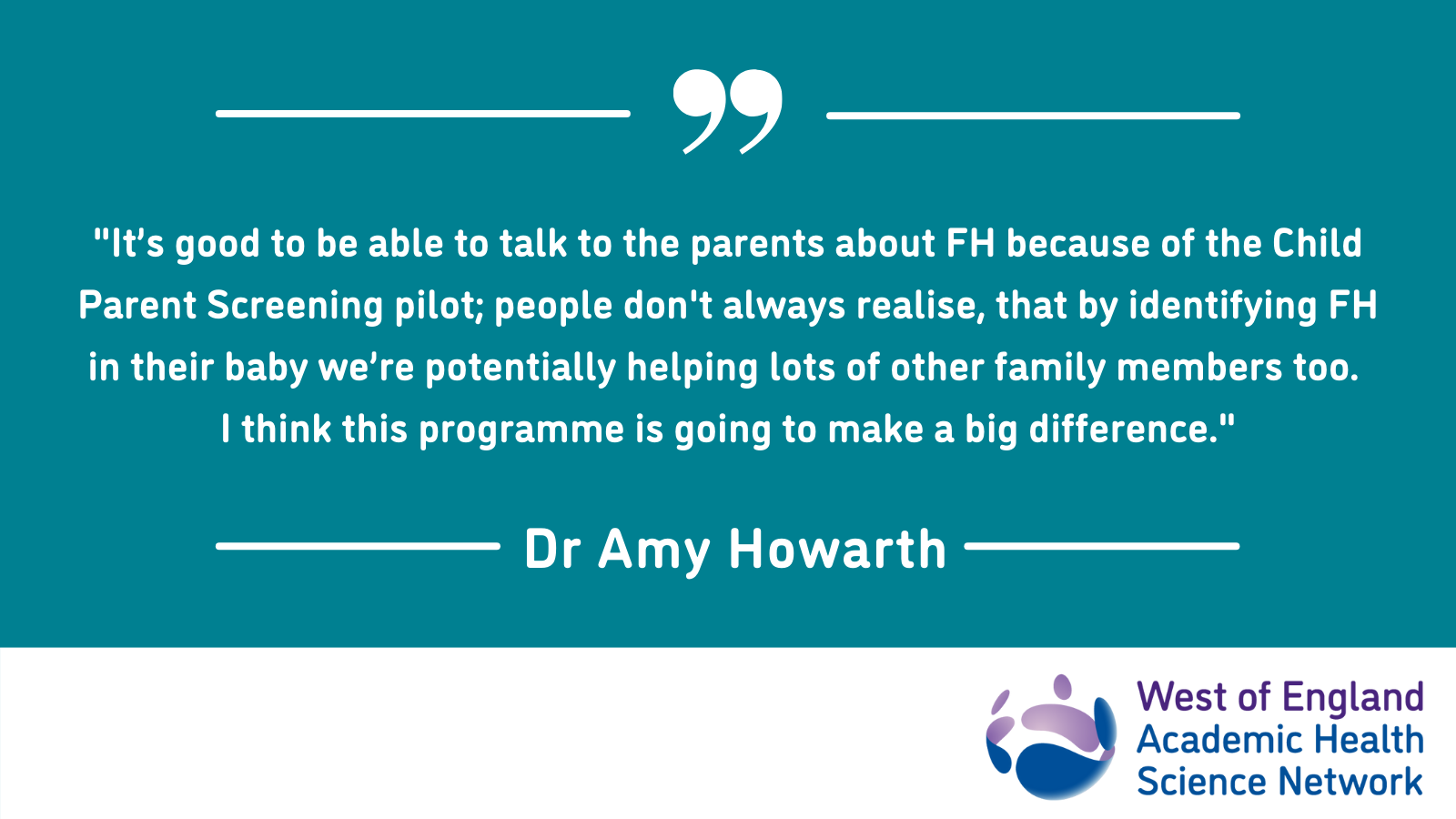
In this blog, Rachel Gibbons, Programme Manager, speaks to GP Dr Amy Howarth whose practice in Gloucestershire is participating in the Child-Parent Screening Service Programme. The Child-Parent Screening Programme is currently being piloted, initially for 24 months, across seven AHSN regions, including in the West of England.
The programme aims to identify families with Familial Hypercholesterolaemia (FH) through the use of a simple heel prick test undertaken at a child’s one year immunisation appointment. FH is an inherited condition which can lead to extremely high cholesterol levels. In those children with a reading of >95 percentile, further genetic testing can be undertaken for family members. FH affects 1 in 250 people in the UK, yet over 90% of cases are still undiagnosed.
Without treatment, FH can lead to heart disease at a young age and significantly increases the incidence of fatal or non-fatal heart attacks. Early detection of FH is important as, if started early enough, treatment gives patients the same life expectancy as the general population.
Child-parent screening offers a population wide, low-cost solution to the management of CVD and is currently the best model for FH detection.
Dr Howarth, why was it important to you to be part of this new programme?
I have Familial Hypercholesterolaemia, so when I heard about this project, I was quite keen to get involved. It’s a really interesting way to potentially increase the diagnosis rate and find more cases.
Apart from those times when there’s a very high cholesterol result, I’m not sure we’re (in primary care) considering FH as often as we could. This programme can help change that.
I was eleven when my dad had a heart attack, in fact it was on my 11th birthday. He was 39 and he went off to work and then my mum had a phone call from his boss saying they had called an ambulance for him.
He was taken to the BRI in Bristol, made a recovery and came home five days later on Christmas Eve – people had longer inpatient stays for MIs (Myocardial Infarction) then. They said that his cholesterol was very, very high and that my sister and I both ought to have our cholesterol tested.
Mine was 6.8 I think at that time and hers was 8.8 so they made the diagnosis of Familial Hypercholesterolaemia. There was a great deal less in the way of diagnostics at that point, no genetic testing or anything, no lipid clinics that I remember.
My parents were advised that we should follow a low-fat diet. No medication was suggested at that time. It wasn’t until I was 17 that my GP prescribed statins and apart from four or five years off when I was trying to get pregnant, being pregnant and breastfeeding, I’ve been taking them ever since.
So, did you feel was there was much support for you as a patient at that time? It was obviously a big shock what had happened to your father.
My father is 72 now and he still gets emotional thinking about that time. My mum was told that he might not make it to the next day. It was all touch and go.
They were also worried about me and my sister. And now I’m a parent, I can imagine how hard that was.
I was referred to a lipid clinic in my 20s. I’d been on statins for several years and my GP wanted to check I was on the right treatment, whether we should be doing anything else.
We know a great deal more about FH now and there’s a lot more support available.
My daughter has been tested and will continue to be monitored.
So, it’s still early days for your Practice, but now you have started to screen children, how have you found it?
We’ve been screening for six weeks and we’ve found that it’s been well received. Everyone who has brought children for their immunisations has wanted to take part in this screening.
And it’s been a straightforward procedure once we’ve gotten used to it and we’ve settled into a routine.
What would you like to see for the future for child-parent screening?
I’d love to see the pilot be successful and demonstrate an increase in case detection rates.
And if it then gets rolled out across the country then that would be amazing.
It would mean that as primary care nurses and doctors we’d be much more aware of FH and FH screening generally. If screening happened at everybody’s one year immunisation appointment, it’s bound to raise awareness amongst healthcare professionals.
I think if it was something that happened nationally, then my nurses would be quite pleased they were involved from the outset. It’s quite exciting to be involved in something that might lead to a national change in practice – and ultimately save lives.
It’s good to be able to talk to the parents about FH as well; people don’t always realise, that by identifying FH in their baby we’re potentially helping lots of other family members too.
I think it’s going to make a big difference.
What would you want other GPs to know if they were considering joining the pilot?
I would say “do it!”. It’s been a good experience so far and it hasn’t taken lots of resources or time.
I’m also keen to know how else we could use the point of care testing machine and whether it’s something that might be a good asset to the practice in the future.
We don’t get all that many opportunities in general practice to be involved in research if you’re not a dedicated research practice, so it’s something exciting and valuable to be involved in.
Get involved
If your GP practice in the West of England and would like to get involved in this programme please contact Rachel Gibbons, Programme Manager – rachel.gibbons10@nhs.net.
Read more about our cardiovascular disease (CVD) programme, including the roll out of Inclisiran.
Posted on February 21, 2022


